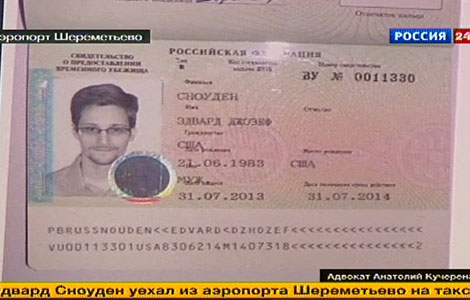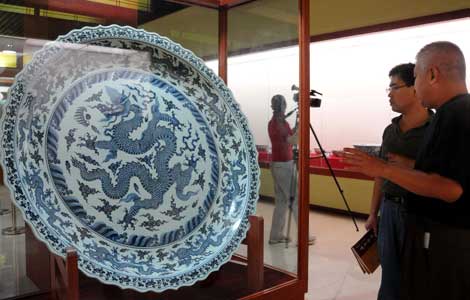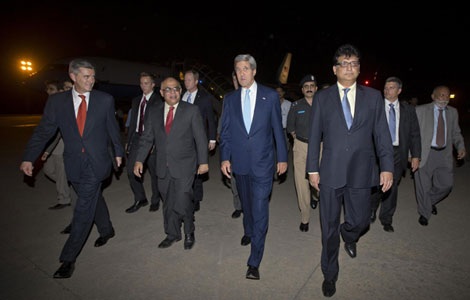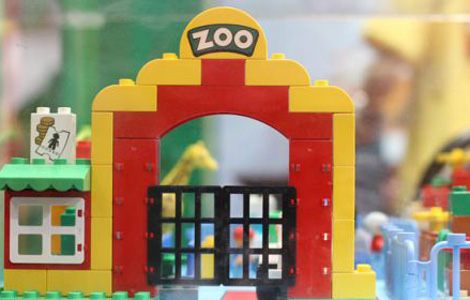Morsi supporters defy police warnings to disperse
Updated: 2013-08-02 08:23
(Agencies)
|
||||||||
The demonstrators also chanted "Execute el-Sissi!" Loudspeakers blared songs supporting Morsi.
The protesters fortified the site, piling up sandbags at its six entrances and adding new guards who stood on alert with their helmets and sticks, sometimes climbing over the gates to check for movement. At one entrance, a second wall of concrete blocks, sandbags and tires was erected.
Medhat Ali, a teacher guarding the gates, said lines of men near the fences will be the first to warn of an impending attack.
"If they see military or police, they will alert us, and in no time the masses inside will pour in to sleep on the asphalt under their vehicles and troops," he said proudly. "We have nothing but some stones and our bare chests. We all have bid our families farewell. We will die here _ or Morsi returns."
Another protester, Magdi Shalash, dismissed the Interior Ministry warning, calling it an attempt to scare away supporters.
"This warning is like nothing. It is like air. We don't even listen to it," said Shalash, a university professor. "We will only leave as dead bodies."
Rally speakers and leading members of the Brotherhood urged more people to join the protest. In a video posted on the Brotherhood's Facebook page, Mohammed El-Beltagi urged those at home to "join us and get the honor of martyrdom."
An influential ultraconservative cleric gave an emotional appeal to authorities to avoid violence, which he said will only lead to a cycle of bloodshed.
"It is foolish to believe that the problem will end in one night and the conflict resolved in one battle," Mohammed Hasaan, said in a 17-minute recording made in a mosque and aired on Al-Jazeera Mubasher Misr, a pro-Brotherhood broadcaster.
"Beware of blood. It will be a curse on those who shed it. The military entering a conflict with Islamists is a loss for it and a real win for the Jews," he said, a reference to Israel.
A military spokesman said its troops are not taking part in the moves against the sit-ins.
Egyptian police have a track record of deadly crackdowns on street protests, and Wednesday's Cabinet move effectively gave security forces the mandate to act as they see fit.
The Interior Ministry had said earlier it would not clamp down on the protesters but will take gradual measures, including warnings and the use of water cannons and tear gas to minimize casualties.
The US Embassy said it will be closed Sunday _ a normal working day _ as a precaution, citing the protests and possible violence. The embassy said in a statement that it may close longer, depending on the situation.
Members of rights groups, joined by activists, organized a visit to the sit-in in eastern Cairo to inspect the place, but it ended abruptly when it descended into a political argument.
In a Facebook post, Seif Abdel-Fattah, a former Morsi adviser, called on all national groups and rights organizations to "go down and encircle (the two sit-ins) with human chains to stop the flood of blood."
Meanwhile, a leading member of Tamarod, or Rebel _ the campaign that spearheaded the petition for Morsi to step down _ said it suggested that law enforcement officials inspect the squares to ensure there are no weapons. But Mahmoud Badr said his proposal was rejected by the pro-Morsi groups.
Late Thursday, a high-level African Union delegation visited the sit-in in eastern Cairo. The delegation had met on Tuesday with Morsi in a secret military facility where he has been detained since his ouster on July 3.
Privately, the Rabaah protesters acknowledge that their sit-in is their last bargaining chip against the military and loyal media that label the encampment as a launching pad for terrorists.
Islamic militants also have been stepping up attacks against security forces in lawless areas in the Sinai Peninsula, raising fears that extremists could exploit the anger over Morsi's removal to spread insurgency.
The Brotherhood has long been one of the most powerful political forces in Egypt, even during its decades in the opposition to autocratic leader Hosni Mubarak, himself ousted in a popular uprising in 2011. But after a series of election wins, including Morsi's narrow victory last year, the group has fallen from favor.

 Snowden granted 1 year's temporary asylum in Russia
Snowden granted 1 year's temporary asylum in Russia
 China sails through 'first island chain'
China sails through 'first island chain'
 City's visa-free offer gets first takers
City's visa-free offer gets first takers
 Property prices rise again
Property prices rise again
 One-stop service offers new hope
One-stop service offers new hope
 Private museums increasingly under spotlight
Private museums increasingly under spotlight
 Apple CEO met China Mobile head, talked co-op
Apple CEO met China Mobile head, talked co-op
 Kerry in Pakistan on unannounced visit
Kerry in Pakistan on unannounced visit
Most Viewed
Editor's Picks

|

|

|

|

|

|
Today's Top News
Snowden granted 1 year's temporary asylum in Russia
China sails through 'first island chain'
US rethinking Putin summit
Property prices rise again
China 'to add more to global growth'
Nation 'confident' on trade
Snowden has entered Russia: lawyer
China opposes US resolution
US Weekly

|

|







